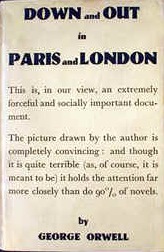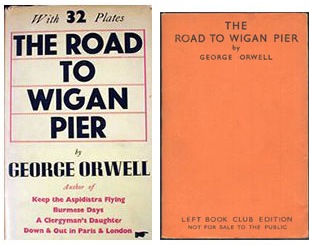
Eric Arthur Blair was a British novelist, poet, essayist, journalist, and critic who wrote under the pen name of George Orwell, a name inspired by his favourite place, the River Orwell. His work is characterised by lucid prose, social criticism, opposition to all totalitarianism, and support of democratic socialism.

Keep the Aspidistra Flying, first published in 1936, is a socially critical novel by George Orwell set in 1930s London. The main theme is Gordon Comstock's romantic ambition to defy worship of the money-god and status, and the dismal life that results.

Down and Out in Paris and London is the first full-length work by the English author George Orwell, published in 1933. It is a memoir in two parts on the theme of poverty in the two cities. Its target audience was the middle- and upper-class members of society—those who were more likely to be well educated—and it exposes the poverty existing in two prosperous cities: Paris and London. The first part is an account of living in near-extreme poverty and destitution in Paris and the experience of casual labour in restaurant kitchens. The second part is a travelogue of life on the road in and around London from the tramp's perspective, with descriptions of the types of hostel accommodation available and some of the characters to be found living on the margins.

Homage to Catalonia is a 1938 memoir by English writer George Orwell, in which he accounts his personal experiences and observations while fighting in the Spanish Civil War.

The Road to Wigan Pier is a book by the English writer George Orwell, first published in 1937. The first half of this work documents his sociological investigations of the bleak living conditions among the working class in Lancashire and Yorkshire in the industrial north of England before World War II. The second half is a long essay on his middle-class upbringing, and the development of his political conscience, questioning British attitudes towards socialism. Orwell states plainly that he himself is in favour of socialism, but feels it necessary to point out reasons why many people who would benefit from socialism, and should logically support it, are in practice likely to be strong opponents.

Eileen Maud Blair was the first wife of George Orwell. During World War II, she worked for the Censorship Department of the Ministry of Information in London and the Ministry of Food.

John Middleton Murry was an English writer. He was a prolific author, producing more than 60 books and thousands of essays and reviews on literature, social issues, politics, and religion during his lifetime. A prominent critic, Murry is best remembered for his association with Katherine Mansfield, whom he married in 1918 as her second husband, for his friendship with D. H. Lawrence and T. S. Eliot, and for his friendship with Frieda Lawrence. Following Mansfield's death, Murry edited her work.
A Hanging (1931) is a short essay written by George Orwell, first published in August 1931 in the John Middleton Murry’s British literary magazine The Adelphi and then reprinted in 1946 in the British literary magazine The New Savoy. Set in Burma, where Orwell had served in the British Imperial Police from 1922 to 1927, it describes the execution of a criminal.
John Rayner Heppenstall was a British novelist, poet, diarist, and a BBC radio producer.
Mark Plowman, generally known as Max Plowman, was a British writer and pacifist.
"The Spike" is a 1931 essay by George Orwell in which he details his experience staying overnight in the casual ward of a workhouse near London. This episode in Orwell's life took place while he was intentionally living as a vagrant in and around London as part of the social experiment that would form the basis of his first book Down and Out in Paris and London. The events of this essay are also found in that book, though the essay is not reprinted verbatim in the book.
The Adelphi or New Adelphi was an English literary journal founded by John Middleton Murry and published between 1923 and 1955. The first issue appeared in June 1923, with issues published monthly thereafter. Between August 1927 and September 1930 it was renamed the New Adelphi and issued quarterly. Murry was editor until 1930, when he handed over to Sir Richard Rees and the monthly issues resumed. Rees was succeeded by Max Plowman in 1938. The magazine included one or two stories per issue with contributions by Katherine Mansfield, A.A. Milne, D. H. Lawrence, H. E. Bates, Rhys Davies, G.B. Edwards and Dylan Thomas. The Adelphi published George Orwell's "The Spike" in 1931 and Orwell contributed regularly thereafter, particularly as a reviewer; in the late 1930s/early 1940s, working class writers Jack Common and Jack Hilton also contributed.
Sir Richard Lodowick Edward Montagu Rees, 2nd Baronet was a British diplomat, writer, humanitarian, and painter.
The Criterion was a British literary magazine published from October 1922 to January 1939. The Criterion was, for most of its run, a quarterly journal, although for a period in 1927–28 it was published monthly. It was created by the poet, dramatist, and literary critic T. S. Eliot who served as its editor for its entire run.
The "London Letters" were a series of fifteen articles written by George Orwell when invasion by Nazi Germany seemed imminent, and published in the American left-wing literary magazine Partisan Review. As well as these "London Letters", PR also published other articles by Orwell.
"Confessions of a Book Reviewer" is a narrative essay published in 1946 by the English author George Orwell. In it, he discusses the lifestyle of a book reviewer and criticises the practice of reviewing almost every book published, which gives rise to this lifestyle.
"A Good Word for the Vicar of Bray" is an essay by the English author George Orwell. In it Orwell encourages the public-spirited action of planting trees, which may well make up for the harm people do in their lives. The essay was first published in Tribune on 26 April 1946.

The bibliography of George Orwell includes journalism, essays, novels, and non-fiction books written by the British writer Eric Blair (1903–1950), either under his own name or, more usually, under his pen name George Orwell. Orwell was a prolific writer on topics related to contemporary English society and literary criticism, who has been declared "perhaps the 20th century's best chronicler of English culture." His non-fiction cultural and political criticism constitutes the majority of his work, but Orwell also wrote in several genres of fictional literature.
Joe Wilson was a Tyneside concert hall songwriter and performer in the mid-19th century. His most famous song is "Keep yor feet still Geordie hinny". He was a contemporary of George "Geordie" Ridley. He wrote and sang in the Geordie dialect of Newcastle upon Tyne, his native speech.
Jack Hilton was a British outsider novelist and essayist adopted into the modernist movement of the 1930s. Hilton's works were experimental, using semi-autobiographical first-person narratives and internal monologue to probe the relation of events in his life - and the lives of his characters - to the feelings and attitudes of himself and his subjects. His writing was also unconventional at the time of its publication for its proud but critical depictions of working-class people and settings, centring on his native Lancashire.






